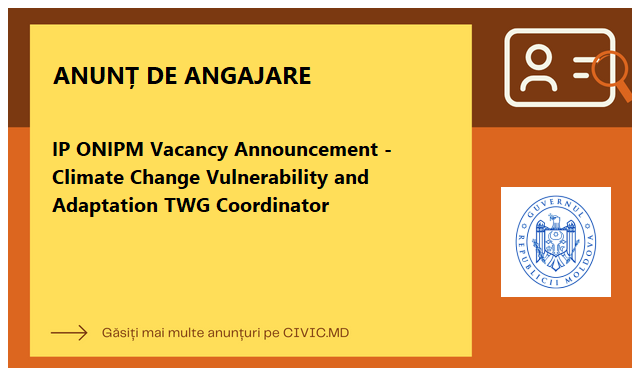Organizații vizate:
Anunțuri de Angajare
- Detalii
- Categorie: Angajări
IP ONIPM Vacancy Announcement - Climate Change Vulnerability and Adaptation TWG Coordinator
Informațiile prezentate în articolul de mai jos pot să nu mai fie actuale sau să nu mai reflecte activitățile și programele curente. Anunțul este păstrat în arhivă pentru a asigura transparența și accesul public la informațiile despre inițiativele și proiectele implementate anterior.

|
PUBLIC INSTITUTION “ENVIRONMENTAL PROJECTS NATIONAL IMPLEMENTATION OFFICE”, PROJECT MANAGEMENT UNIT OF THE SECOND BIENNIAL TRANSPARENCY REPORT AND SIXTH NATIONAL COMMUNICATION UNDER THE UNFCCC VACANCY ANNOUNCEMENT |
||
|
I. Position Information |
||
|
Project Title:
|
“Moldova: Enabling Activities for the Preparation of Combined Second Biennial Transparency Report and Sixth National Communication (BTR2/NC6) to the United Nations Framework Convention on Climate Change (UNFCCC)” |
|
|
Job Title (part-time position):
|
Vulnerability Assessment, Climate Change Impacts and Adaptation Measures Thematic Working Group Coordinator |
|
|
Indicative workload:
|
Up to 10 working/days per month |
|
|
Duration of employment: |
June 2025 – September 2026, with possibility of extension until December 2026 |
|
|
II. Background |
||
|
The project aims to support the Republic of Moldova (RoM) to prepare and submit its Combined Second Biennial Transparency Report and Sixth National Communication (BTR2/NC6) that complies with the United Nations Framework Convention on Climate Change (UNFCCC) and Paris Agreement (PA) reporting requirements while responding to national development goals. Under the UNEP/GEF Project “Moldova: Enabling Activities for the Preparation of Combined Second Biennial Transparency Report and Sixth National Communication (BTR2/NC6) to the United Nations Framework Convention on Climate Change (UNFCCC)”, Moldova will receive support to prepare its BTR2/NC6 report and submit it to the UNFCCC by December 2026, in compliance with UNFCCC and PA reporting requirements and in alignment to national development goals, with built-in flexibility provided in light of its capacities. Moreover, the country will be supported to undertake a self-assessment and stocktaking exercise for preparation of the project proposal for the subsequent BTR development. Thus, the two expected outputs under the BTR2/NC6 project are as following: Output 1: BTR2/NC6 report prepared and submitted to UNFCCC by December 2026. Output 2: Self-assessment and stocktaking exercise for preparation of the project proposal for subsequent BTR3 under the UNFCCC and Paris Agreement completed. The content of deliverables produced under the first output must follow the Modalities, Procedures and Guidelines (MPGs) for the transparency framework for action and support referred to in Article 13 of the Paris Agreement (FCCC/PA/CMA/2018/3/Add.2). Moreover, as adopted at COP 26 in Decision 5/CMA.3, the following will be observed: (i) outlines for the BTR & National Inventory Document (NID); (ii) the Common Reporting Tables (CRT) for reporting GHG Inventory and the Common Tabular Formats (CTF) for reporting the NDC progress, financial, technology development and transfer and capacity-building support provided and mobilized, as well as support needed and received (FCCC/PA/CMA/2021/10/Add.2). The BTR2/NC6 project will build on findings and recommendations from the technical expert review of the BTR1 and expert review of previous NCs and BURs. The combined BTR2/NC6 Report is expected to include the following content: · National inventory report of anthropogenic emissions by sources and removals by sinks of greenhouse gases; · Information necessary to track progress made in implementing and achieving nationally determined contributions under Article 4 of the Paris Agreement; · Information related to climate change impacts and adaptation under Article 7 of the Paris Agreement; · Information on financial, technology development and transfer and capacity-building support needed and received under Articles 9–11 of the Paris Agreement; · Other relevant information, including: Research and Systematic Observation; Education, Training and Public Awareness; and Gender Mainstreaming into the Climate Policies; · Publication and submission of report, and other project execution support. |
||
|
III. Organizational Context |
||
|
The project is executed by the BTR2/NC6 Project Management Unit (PMU) established by the Public Institution “Environmental Projects National Implementation Office” (P.I. “EPNIO”) of the Ministry of Environment (MoEN), on behalf of the Government of the Republic of Moldova, and in consultation with the UNEP. As national executing agency, the PMU established by the P.I. “EPNIO” is primarily responsible for the planning and management of the project activities, accounting, reporting, monitoring and evaluation of the project. Under the guidance and direct supervision of the National Project Manager (NPM), the Vulnerability Assessment, Climate Change Impacts and Adaptation Measures Thematic Working Group Coordinator will lead the developing of: · Chapter 3: ‘Information related to climate change impacts and adaptation under Article 7 of the Paris Agreement’ of the combined BTR2/NC6 of the Republic of Moldova under the UNFCCC. Chapter 3 provides information related to climate change impacts and adaptation under Article 7 of the Paris Agreement as appropriate. The information provided under this chapter could facilitate, among other things, recognition of the adaptation efforts of developing country Parties. Information to be provided in this chapter includes but is not limited to: · National circumstances, institutional arrangements and legal frameworks related to adaptation; · Impacts, risks and vulnerabilities, as appropriate; · Adaptation priorities and barriers; · Adaptation strategies, policies, plans, goals and actions to integrate adaptation into national policies and strategies; · Progress on implementation of adaptation; · Monitoring and evaluation of adaptation actions and processes; · Information related to averting, minimizing and addressing loss and damage associated with climate change impacts; · Cooperation, good practices, experience and lessons learned; · Any other information related to climate change impacts and adaptation under Article 7 of the Paris Agreement; · Specific flexibility provisions applied; · Information on areas of improvement in relation to reporting The above proposed scope of work is categorized into the following six main deliverables: 1.3.1. The section on national circumstances, institutional arrangements and legal frameworks related to adaptation compiled, including: - Information on national circumstances relevant to its adaptation actions, including biogeophysical characteristics, demographics, economy, infrastructure and information on adaptive capacity; - Information on institutional arrangements and governance, including for assessing impacts, addressing climate change at the sectoral level, decision-making, planning, coordination, addressing cross-cutting issues, adjusting priorities and activities, consultation, participation, implementation, data governance, monitoring and evaluation, and reporting; - Information on legal and policy frameworks and regulations. 1.3.2. The section on impacts, risks and vulnerabilities compiled, including: - Information on current and projected climate trends and hazards; - Information on observed and potential impacts of climate change, including sectoral, economic, social and/or environmental vulnerabilities; - Information on approaches, methodologies and tools used, and associated uncertainties and challenges; - Conduct vulnerability assessments for priority sectors identified; - Technical capacity building, including participation of project staff and national consultants in regional/international workshops and trainings on climate modelling and data analysis to enhance the country's capacity to conduct vulnerability/adaptation and loss and damage assessments to strengthen climate change adaptation planning, as appropriate. 1.3.3. The section on adaptation priorities and barriers; adaptation strategies, policies, plans, goals and actions to integrate adaptation into national policies and strategies; on progress on implementation of adaptation actions; and on monitoring and evaluation of adaptation actions and processes, compiled, including: - Compile information on the country’s vulnerability to the adverse effects of climate change, the progress on implementation of adaptation actions and processes for priority sectors identified; - Provide information on domestic adaptation priorities, adaptation challenges, gaps, and barriers to adaptation, as applicable; - Compile, as applicable, information on efforts to integrate climate change into development efforts, plans, policies, and programming, including related capacity-building activities; - Compile information on monitoring and evaluation (M&E) of adaptation actions and processes, including: achievements, impacts, resilience, review, effectiveness and results; approaches and systems used, and their outputs; assessment of and indicators for: how adaptation increased resilience and reduced impacts; when adaptation is not sufficient to avert impacts; how effective implemented adaptation measures are; implementation, in particular on: transparency of planning and implementation; how support programmes meet specific vulnerabilities and adaptation needs; how adaptation actions influence other development goals; good practices, experience and lessons learned from policy and regulatory changes, actions and coordination mechanisms. - Provide information related to the effectiveness and sustainability of adaptation actions, as appropriate, including on: ownership, stakeholder engagement, alignment of adaptation actions with national and subnational policies, and replicability; the results of adaptation actions and the sustainability of those results. 1.3.4. The section information related to averting, minimizing and addressing loss and damage associated with climate change impacts compiled, including: - Compile information related to observed and potential climate change impacts, including those related to extreme weather events and slow onset events, drawing upon the best available science; - Provide information on activities related to averting, minimizing and addressing loss and damage associated with the adverse effects of climate change; - Compile information on institutional arrangements to facilitate the implementation of the activities related to averting, minimizing and addressing loss and damage associated with climate change impacts. 1.3.5. The section information related to cooperation, good practice, experience and lessons learned, including consideration with a gender lens perspective, compiled: - Describe the efforts to share information, good practices, experience and lessons learned, including as they relate to: science, planning and policies relevant to adaptation; policy innovation and pilot and demonstration projects; integration of adaptation actions into planning at different levels; cooperation to share information and to strengthen science, institutions and adaptation; area, scale and types of cooperation and good practices; improving durability and effectiveness of adaptation actions; helping developing countries to identify effective adaptation practices, needs, priorities, and challenges and gaps in a way that is consistent with encouraging good practices; - Compile information on strengthening scientific research and knowledge related to: climate, including research and systematic observation and early warning systems, to inform climate services and decision-making; vulnerability and adaptation; monitoring and evaluation. 1.3.6. Chapter 3 ‘Information related to climate change impacts and adaptation under Article 7 of the Paris Agreement’ of BTR2/NC6 Report compiled and validated: - Compile Chapter 3 ‘Information related to climate change impacts and adaptation under Article 7 of the Paris Agreement’ for inclusion into the BTR2/NC6 Report; - Organize a national workshop to present the obtained results on climate change impacts and adaptation, to all interested partners and relevant stakeholders, policy makers, decision makers and with participation of the representatives of civil society and environmental NGOs. |
||
|
IV. Key Tasks / Results Expected |
||
|
Key Tasks: · Assist the NPM in preparation of a work plan relevant to the activity; · Suggest on technical capacity building and participate in the sub-regional, regional and international trainings on vulnerabilities assessments, climate change impacts and adaptation measures; · Assist the NPM in arranging the national review and training workshops on vulnerability assessment, climate change impacts and adaptation measures; · Overview the description of the national circumstances, institutional arrangements and legal frameworks for vulnerability assessment, climate change impacts and adaption measures; · Overview the assessment of climate change impacts, risks and vulnerabilities; · Overview the assessment of climate change adaptation; · Overview the description of the information on loss and damage associated with climate change impacts; · Overview the description of the cooperation, good practices, experience and lessons learned related to climate change impacts and adaptation under Article 7 of the Paris Agreement; · Contribute substantially to development of Chapter 3: ‘Information related to climate change impacts and adaptation under Article 7 of the Paris Agreement’, for inclusion in the BTR2/NC6 of the Republic of Moldova to the UNFCCC and Paris Agreement. |
||
|
Key Deliverables: · Chapter 3: ‘Information related to climate change impacts and adaptation under Article 7 of the Paris Agreement’ of the combined BTR2/NC6 of the Republic of Moldova under the UNFCCC; · Contribution to the developing pf the List of Acronyms, Abbreviations and Units, Executive Summary and Bibliography of the combined BTR2/NC6 of the RoM to the UNFCCC. |
||
|
V. Recruitment Qualifications |
||
|
Education: |
Master’s Degree in Climatology, Geography, Biology, Agriculture, Environmental Sciences or other fields relevant to the project is required. Additional trainings and certifications would be an advantage. |
|
|
Experience: |
· At least 7 years of work experience in project implementation, including management of experts’ team in national and international organizations is required; · At least 6 years of demonstrated experience in projects with similar tasks (elaboration of national communications, biennial update reports and biennial transparency reports; elaboration of national climate change adaptation strategies and programs of the Republic of Moldova; elaboration of of the adaptation component of the nationally determined contributions of the RoM to the Paris Agreement); · At least 5 years of professional experience in technical activities related to climate change modelling and vulnerability assessments; · Advanced proficiency level and demonstrated experience in using various analytical tools and instruments (e.g., MS Excel, Statistical Programs STATISTICA, STATGRAF, R, RClimDex, ArcGIS, Global and Regional Climate Modelling Systems) demonstrated by previous assignments; · Extensive knowledge of UNFCCC and Paris Agreement requirements; · Strong analytical and report writing skills demonstrated by previous assignments; · Strong communication and teamwork/coordination skills demonstrated by previous assignments. |
|
|
Language Requirements: |
Good command of Romanian, Russian and English languages. |
|
|
Interested individuals must submit the following documents/information to demonstrate their qualifications: 1. Proposal, explaining why incumbent is the most suitable for the work, including past experience in similar assignments, providing a brief information on above qualifications and methodology on how he/she will approach and conduct the work. 2. Financial proposal (in USD), specifying a fee per day. 3. CV, including past experience in similar projects. |
||
|
Financial proposal The Financial Proposal shall specify a daily lump-sum fee (indicating if it is negotiable). Payments will be made quarterly, based on the actual number of days worked, subject to the submission and approval by the National Project Manager of the activity reports around specific and measurable (qualitative and quantitative) deliverables specified in the TOR. |
||
|
Documents should be submitted by email on cancelaria@onipm.gov.md, no later than Tuesday, 27 may 2025, by 5:00 PM. Only those shortlisted will be contacted. |
||









